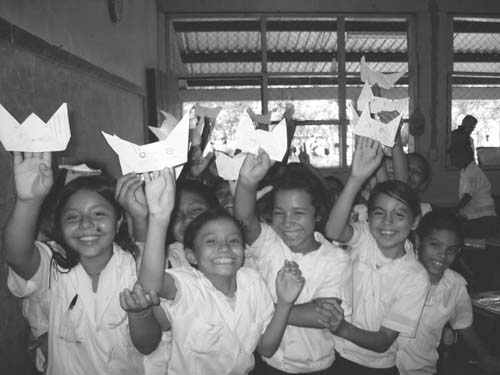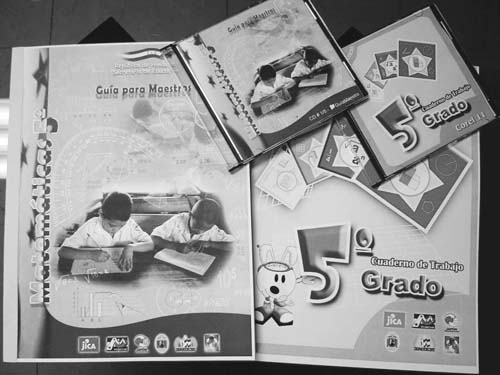Japan's Official Development Assistance White Paper 2006
Main Text > Part II ODA DISBURSEMENTS IN FISCAL YEAR 2005 > Summary
Part II ODA DISBURSEMENTS IN FISCAL YEAR 2005

Honduras faces the issue of children having to repeat a grade or dropping out of school because of academic underachievement. In Honduras, even primary school children are required to repeat a year due to such academic underachievement. (Photo: JICA)

Materials used for arithmetic in Honduras (Photo: JICA)
Summary
Part II, Chapter 1 outlines the disbursements of Japan's ODA in 2005 based on the statistics of the Development Assistance Committee (DAC) of the Organisation for Economic Co-operation and Development (OECD). Chapter 2 is devoted to comprehensive descriptions of ODA disbursements in FY2005 (April 2005 through March 2006), including the new development of aid policy.
In 2005 (calendar year), Japan's ODA disbursements totaled about US$13.15 billion, an increase of 47.3% from the previous year. The higher figure is due to two special factors of debt relief applied to Iraq and debt payment deferrals applied to Indonesia. Excluding them, ODA disbursements decreased 4.1% from the previous year.
Of the disbursements in 2005, 79.2% were in the form of bilateral ODA while 20.8% were channeled through international organizations.
Notable moves in FY2005 included assistance to nation building in Iraq, ODA for China, and the offering of patrol vessels to Indonesia.
The international community including Japan continues its assistance for Iraq's nation building. In its commitment to assisting Iraq's reconstruction, Japan has been promoting "dual wheels" of the dispatch of the Self-Defense Forces (SDF) on one side and assistance through ODA on the other. Japan has already pledged grant aid of about US$1.5 billion in total. It has further decided upon the training of administrators and engineers; reconstruction assistance through international organizations and non-government organizations (NGOs); and debt reduction for the country worth about US$6 billion. As its Ground Self-Defense Force (GSDF) withdrew from Iraq in July 2006, Japan is about to fully enter the stage of assistance through yen loans.
At a Japan-China foreign ministerial meeting of April 2005, the two countries reached a common recognition concerning the conclusion of the extension of new yen loans by the time of the Beijing Olympic Games in 2008. Currently working-level discussions are underway focusing on details of the matter. On the other hand, Japan provides China with grant aid and technical cooperation in projects such as those that contribute to solving common issues of the two countries such as environmental problems and infectious diseases and in those that contribute to the promotion of mutual understanding and exchanges.
In March 2005, pirates attacked the Japanese vessel Idaten in the Strait of Malacca and abducted some of the Japanese crew. Japan in response sought to strengthen countermeasures against terrorists and pirates, offering three patrol vessels to Indonesia through grant aid in June 2006. The vessels, which were equipped with bulletproof features, were identified as arms under Japan's Three Principles to Ban Exports of Arms and in other relevant contexts. However, the vessels were made an exception from the said principles following a Japan-Indonesia governmental agreement and a relevant statement by the Chief Cabinet Secretary. The agreement stipulated that the ships would be used solely for controlling acts of terrorism and piracy and that the ships would not be transferred to third parties without Japan's consent.


 Next Page
Next Page